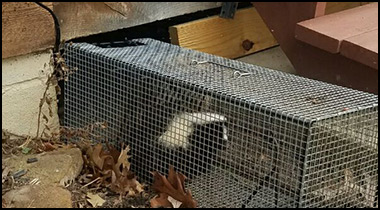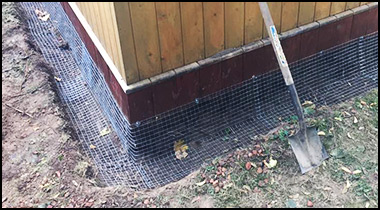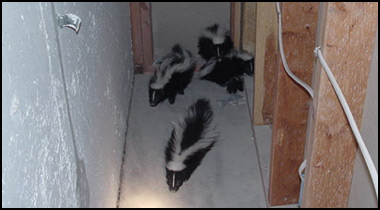Orlando Skunk Removal Resources
Skunk Rehabber - Back to Nature Wildlife Refuge: (407) 568-5138
Free Orange County Animal Services: 407-254-9140
Humane Wildlife Trappers of Orlando: 407-232-9287
If you need skunk control in Orlando, you have a few options. First, you can attempt to solve the skunk problem yourself by reading our do-it-yourself guide. If you need outside help, you can also call Orange County Animal Services to see if they have any free resources or help for you - however, they primarily deal with dog and cat concerns. You can also call a local Orlando wildlife rehabber, as they are typically a great resource for advice that is in the best welfare of the animal. If as a last resort you must hire a professional company, we recommend Humane Wildlife Trappers of Orlando at 407-232-9287. To learn more about them or check their skunk removal prices, visit orlandopestanimal.com.

Orlando Skunk Trapping and Removal

Preventative Repairs & Exclusion

Orlando Skunk Removal From Structures
In many cases, preventative measures can solve your Orlando skunk problem - keep garbage secured, pet food indoors, and most of all when it comes to skunks, secure the perimeter of your shed, porch, deck, or house with a barrier - lattice or steel mesh is good, and it keeps Florida skunks from going under the structure. If trapping and removal of the skunk is the only option you have, please do so with the help of a local agency or professional company who knows how to do it humanely and legally. Browse the resources of this site for more educational information.
Frequently Asked Questions:
Prevention: How to Keep Skunks Away
What to do with a skunk after I catch it?
Is it legal for me to trap a skunk?
How to remove skunk odor
Is a skunk active during the daytime rabid?
What does skunk feces look like?
Orlando Skunk Control Information: Do Skunks hibernate in the winter?
The winter months are not very much different for the skunk than the warmer months. Though they do not actually hibernate they do tend to sleep more during the colder months. One of the more pronounced difference between the skunk during the winter and the summer is they can be easily found out of their dens during the day and socializing with other skunks. You will find in the winter that after a long episode of snow or their inability to leave the den, this forager will go at first chance to find food.
Unlike birds and/or rodents the skunk will not prepare for the winter by stockpiling food. Instead they will eat more in the fall. This will provide the skunk with a heavier coat.
The skunk will also change their residence for the winter. Those that live in populated areas will use under porches, sheds and even patios for the winter. The skunk in the wild will also use another's belonging by taking over abandoned burrows and dens, in spite of the skunks digging capabilities.
For skunk and all wildlife removal in Orlando FL, visit www.orlandopestanimal.com website to learn more.
During the winter the skunk becomes dormant. This is also known as torpor. It is at this time that the skunk will not fully hibernate. Torpor is regulated by two factors the outdoor temperature and the availability of food. The body temperature of the skunk can go down as low as 24 degrees at which time their metabolism slows.
With the use of leaves or grasses the skunk will seal off the entrance of his den to keep it warm. The traditional anti-social skunk will however share a den with another or several other skunks. Using their social thermoregulation, the skunk can regulate their temperatures to keep the group warm. However, when the warmer seasons arrive they will separate and go their own way.
Beginning in February and going through to April the breeding season begins. While the male skunk will have multiple mates the female skunk will on take one. After breeding both male and female skunks will begin to gain the weight they had lost during the winter. This is approximately 30percent of the total body fat.
Once the warm weather arrives the female will build maternity dens often with other females. As for the male skunk, he will once again become a loner and take on his summer diet of insects, trash and mammals
Remember, for free services you can try (407) 568-5138 or 407-254-9140, but if you need to pay for professional help, check the prices at the orlandopestanimal.com website. Or follow our do-it-yourself guide!

